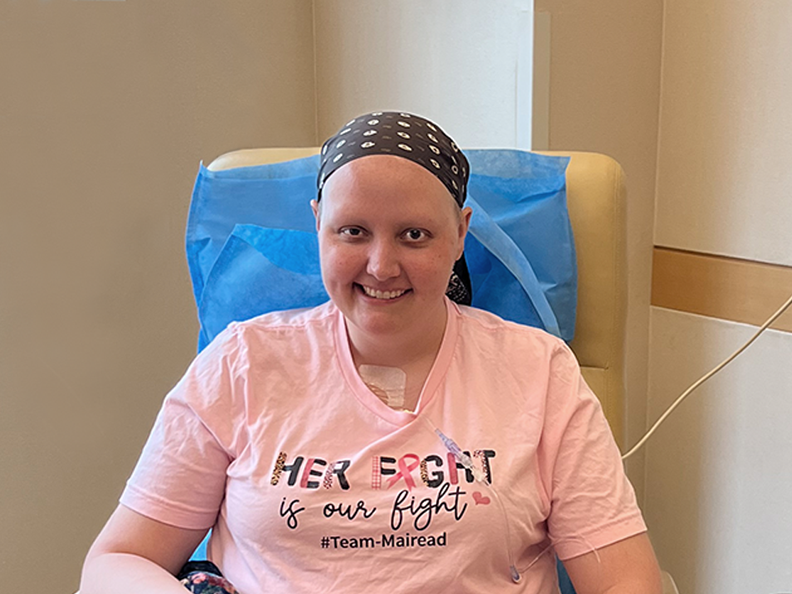Your gift is 100% tax deductible
Questions to Ask Your Doctor About Vulvar Cancer
It is important for you to have honest, open discussions with your cancer care team. They want to answer all of your questions, no matter how trivial you might think they are. Here are some questions to consider:
Questions to ask after getting a diagnosis
- What type of vulvar cancer do I have?
- Can you explain my pathology report (laboratory test results) to me?
- What is the stage of my cancer? What does this mean?
Questions to ask about choosing a treatment and managing side effects
- What are my treatment options?
- What types of clinical trials are being done for vulvar cancer? Do clinical trials offer additional treatment options for me?
- What treatment plan do you recommend? Why?
- What is the goal of each treatment? Is it to eliminate the cancer, help me feel better, or both?
- What are the possible short-term and long-term side effects of treatment?
- Who will be part of my health care team, and what does each member do?
- Who will be leading my overall treatment?
- If I have questions or problems, whom do I call?
- How will this treatment affect my daily life? Will I be able to work, exercise, and perform my usual activities?
- How will this treatment affect my sex life, and for how long?
- Could this treatment affect my ability to become pregnant or have children? If so, should I talk with a fertility specialist before cancer treatment begins?
- If I’m worried about managing the costs of cancer care, who can help me?
- How can I keep myself as healthy as possible during treatment?
- What support services are available for me? For my family?
Questions to ask about having surgery
- What type of surgery will I have? Will lymph nodes be removed?
- Who will be doing the surgery? How experienced is the surgeon with this type of operation?
- How long will the operation take?
- How long will I be in the hospital?
- Can you describe what my recovery from surgery will be like?
- Who should I contact about any side effects I experience? And how soon?
- What are the possible long-term or late effects of having this surgery?
- What can be done to prevent or relieve side effects?
- Is reconstructive surgery an option?
Questions to ask about having radiation therapy
- What type of treatment is recommended?
- What is the goal of this treatment?
- How long will it take to give this treatment?
- What side effects can I expect during treatment?
- Who should I contact about any side effects I experience? And how soon?
- What are the possible long-term or late effects of having this treatment?
- What can be done to prevent or relieve the side effects?
Questions to ask about therapies using medication
- What type of treatment is recommended?
- What is the goal of this treatment?
- How long will it take to give this treatment?
- Will I receive this treatment at a hospital or clinic? Or will I take it at home?
- What side effects can I expect during treatment?
- Who should I contact about any side effects I experience? And how soon?
- What are the possible long-term or late effects of having this treatment?
- What can be done to prevent or relieve the side effects?
Questions to ask about planning follow-up care
- What is the chance that the cancer will come back? Should I watch for specific signs or symptoms?
- What long-term side effects or late effects are possible based on the cancer treatment I received?
- What follow-up tests will I need, and how often will those tests be needed?
- How do I get a treatment summary and survivorship care plan to keep in my personal records?
- When should I return to my primary care doctor for regular medical care?
- Who will be leading my follow-up care?
- What survivorship support services are available to me? To my family?
In addition to these sample questions, be sure to write down some questions of your own. For instance, you might want specific information about anticipated recovery times so that you can plan your work schedule. Or you may want to ask about second opinions or about clinical trials for which you may qualify.
Other health care professionals, such as nurses and social workers, may have the answers to some of your questions. Learn more in Who Is the Cancer Care Team?
- Written by

Developed by the American Cancer Society medical and editorial content team with medical review and contribution by the American Society of Clinical Oncology (ASCO).
Last Revised: May 2, 2025
American Cancer Society medical information is copyrighted material. For reprint requests, please see our Content Usage Policy.
American Cancer Society Emails
Sign up to stay up-to-date with news, valuable information, and ways to get involved with the American Cancer Society.



